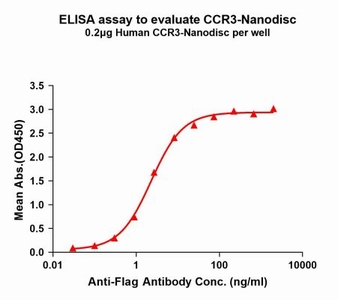
Size:50 μg
Price:$ 4400
Brand:NewEast  Place of Origin:USA
Immunogen:
Place of Origin:USA
Immunogen:
| Cat.#: 11056 | ||
| Product Name: Human CCR3 Full Length Protein | ||
| Size : 10 µg, 50 µg and 100 µg | ||
| Synonyms: CC-CKR-3; C C CKR3; CD193; CKR 3; CKR3; CMKBR3 | ||
| Target: CCR3 | ||
| UNIPROT ID: P51677 | ||
| Description: Human CCR3 full length protein-synthetic nanodisc | ||
| Background: The protein is a receptor for C-C type chemokines. It belongs to family 1 of the G protein-coupled receptors. This receptor binds and responds to a variety of chemokines, including eotaxin (CCL11), eotaxin-3 (CCL26), MCP-3 (CCL7), MCP-4 (CCL13), and RANTES (CCL5). It is highly expressed in eosinophils and basophils, and is also detected in TH1 and TH2 cells, as well as in airway epithelial cells. This receptor may contribute to the accumulation and activation of eosinophils and other inflammatory cells in the allergic airway. It is also known to be an entry co-receptor for HIV-1. This gene and seven other chemokine receptor genes form a chemokine receptor gene cluster on the chromosomal region 3p21. Alternatively spliced transcript variants have been described. | ||
| Species/Host: HEK293 | ||
| Molecular Weight: The human full length CCR3 protein has a MW of 41.0 kDa | ||
| Formulation & Reconstitution: Lyophilized from nanodisc solubilization buffer (20 mM Tris-HCl, 150 mM NaCl, pH 8.0). Normally 5% – 8% trehalose is added as protectants before lyophilization. | ||
| Storage & Shipping: Store at -20°C to -80°C for 12 months in lyophilized form. After reconstitution, if not intended for use within a month, aliquot and store at -80°C (Avoid repeated freezing and thawing). Lyophilized proteins are shipped at ambient temperature. | ||
|
Select By Alphabet
A B C D E F G H I J K L M N O P Q R S T U V W X Y Z
Subscribe to our latest email
(+1) 610-945-2007 [email protected] [email protected] 840 First Avenue, Suite 400, King of Prussia, PA 19406
Copyright © 2010 - 2024 NewEast Biosciences | All rights reserved
Bioactive Transmembrane Proteins Antibodies for Transmembrane Proteins G Protein | GTPase




 Add to cart
Add to cart
 Download
Download




